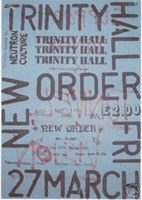Rise of Punk
- https://archive.trinitybristol.org.uk/events/rise-of-punk
- Rise of Punk
- 1981-03-27T19:00:00+00:00
- 1981-03-27T23:10:00+00:00
- Trinity has long been home to alternative music in the City, notability the rise of punk in the late 1970s and New Wave in the early 1980s
- What bristol_sound activities archive radicalism
- When 27 Mar, 1981 from 07:00 PM to 11:10 PM (UTC / UTC0)
-
Add event to calendar
iCal
‘You’ve taken my thinking, my means of survival. You thrust in my hand your gun and your Bible. You told me to kill for the Lord up above. You taught me to hate when I know there is LOVE.’ Crass
Angry loud and extreme, punk enjoyed a counter culture status in Bristol. Punk, like Reggae, was often unpopular with city centre venues. The scene was associated with violence, although according to some this was often caused by youths settling grudges or continuing local rivalries.
Former member of the X-Certs Taff explains:
“There were fights like if there was a big concert like a big group like the Clash or Stranglers. Everybody in Bristol would come so you would have a Bristol Rovers Gang and a Bristol City gang in the same place. Afterwards you guarantee there will be a fight because of the fight last month and that was because of the fight the week before...a lot of places stopped allowing punk groups to play because of the trouble. You’d go to a pub and say can we play?” And they’d say “no its too much trouble.”
The Locarno was one of the few city centre venues which staged punk gigs. Like their Reggae counterparts, Punk bands found a home in Bristol’s 'black run' venues such as the Bamboo Club, the BQ Pub (both in St Paul's) and Trinity. But Trinity became a venue of choice. Unlike Reggae, punk brought regular live music to Trinity. Acts that graced the stage included local bands The Spics, the X-Certs, Art Objects, Blue Wave, Vice Squad, Crass, post-punk band the Stingrays and national bands such as Echo and the Bunnymen and Joy Division.
Joy Division’s 1980 concert at Trinity prefigured the suicide by its iconic lead singer Ian Curtis. The concert finished prematurely after Curtis suffered another of the epileptic seizures that blighted his career and deepened his depression. He committed suicide later that year. The remaining members reformed and performed at Trinity under the name, by which they were to enjoy renewed success, New Order (1979/80).
As testament to its reputation for rebel music Trinity hosted Bristol’s first Festival of Punk in 1981. You can read more about post-Punk Bristol on the Bristol Archive Records website.


New Order flyer, 1981, and Buzzocks at Trinity, 1983

